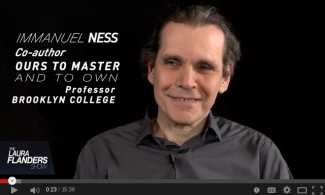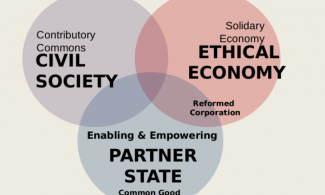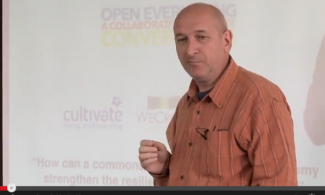Economics As If Future Generations Mattered
Current economic calculations do not recognize the full cost to the Commons – the cultural and natural heritage we share that is the foundation of our economy.
PACA Annual Membership Meeting
Our first ever Annual Membership Meeting is coming up on November 15th. All co-op members, staff, and supporters are encouraged to attend. We need you to help us chart the course for Philadelphia’s cooperative economy!
Denver’s Immigrant Taxi Drivers Build Unionized Workers Co-op
This month 800 immigrant taxi drivers in Denver—from 24 different countries in Africa—joined the Communications Workers (CWA) Local 7777. They hope to break out of poverty and challenge the workplace abuse many endure working for private taxi companies.
The drivers also voted to build a worker-owned taxi cooperative, as an alternative to the existing companies. The local union movement is supporting the effort.
10 ideas for change: Co-operative local economies
As the cracks in corporate capitalism deepen, the co-operative economy is gaining strength. Rooted in community and in the democratisation of ownership, co-operative structures allow citizens to reclaim power over their workplaces, their open spaces, their housing, shops and public realm. Here are ten ideas for building grassroots democratic economies:
Ask Co-op Cathy
Introducing: Co-op Cathy!
Equal Exchange Co-op Seeks Sales Rep
The primary responsibility of this position is to grow sales in a given territory by maintaining relationships with existing customers and seeking new sales opportunities. This person will approach their sales work through self-motivated means and independence. An EE sales representative must embody the principles of the mission while clearly communicating the authentic difference in the market.
Greensboro Residents are Creating a Low-Income Food Co-op
For more than 15 years, there were many efforts to lure a new grocery store into the space. However, while the store would be profitable, it wouldn’t be profitable enough to satisfy the demands of the shareholder-based economy of a large corporation.
The Massive Feminist Protest the English-Speaking World Completely Ignored
Last Wednesday, a massive feminist strike paralyzed the streets of Barcelona, with thousands of women and their allies shutting down traffic and the subways, spray-painting feminist slogans all over city walls and occupying the offices of powerful political and economic institutions.
The Commons are Making a Comeback
The commons is an old, simple idea but one that we have never needed so urgently. It’s whatever a community of people shares and manages together. A commons can be anything from a lake that has been fished for centuries to a folk song no one owns to a neighborhood garden to the planet itself.
Can New Work Really Work?
On a recent Monday morning at 9 a.m., when most of America was heading to the office, a bookish, unassuming, middle-aged man named Blair Evans gave a talk about the work he’s been doing in Detroit. Work that, if manifested in the way he and his team are planning, has the ability to profoundly change Detroit, and the world.
Prefigurative Politics and the Student Nonviolent Coordinating Committee
Current discussions about prefigurative politics bring back warm and reflective memories of my four years on the staff of the Student Nonviolent Coordinating Committee (SNCC), or “snick” as the letters were turned into an acronym.
Support Cooperation Jackson's Sustainable Communities Initiative
Cooperation Jackson is on the move! We are working diligently to advance the work of the Jackson-Kush Plan.
We have been busy since the Jackson Rising: New Economies Conference, establishing the institutional and operating structures of Cooperation Jackson, and systematically building cooperative enterprises.
We have launched two major initiatives to establish a firm foundation for our future: The Chokwe Lumumba Center for Economic Democracy and Development and the Sustainable Communities Initiative.
Cooperative Foundation Releases Study of Co-op Needs
As a funder of groups developing new cooperative education materials, The Cooperative Foundation commissioned a study to answer the following questions:
How do we assess that the materials are being produced by the best available source?
How do we assure that the materials are available for use beyond the local or regional organization?




